Politics
26 November 2018 - Deputy Prime Minister Rafet Husović hosted an inaugural visit by Ambassador of the Republic of Macedonia to Montenegro Mihajlo Trpkovski. DPM Husović welcomed Ambassador Trpkovski and expressed readiness for cooperation to further improve the good relations between Montenegro and Macedonia.
Ambassador Trpkovski thanked him for a warm welcome and expressed his satisfaction that he is in a friendly and beautiful country. The Ambassador informed Deputy Prime Minister Husović of the current political situation in Macedonia and their commitment to start the process of Euro-Atlantic integration, in which Montenegro has already moved far.
The two officials agreed that there is room for additional cooperation between the two countries, especially in the field of tourism and agriculture.
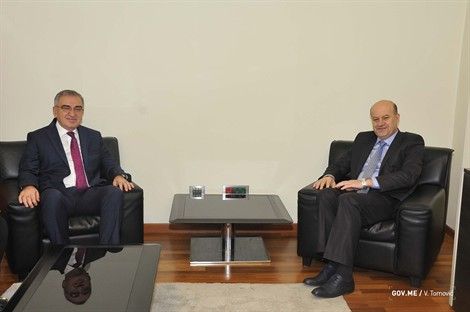
Deputy Prime Minister also hosted a farewell visit by Ambassador of the Republic of Turkey to Montenegro Serhat Galip.
DPM Husović pointed to the excellent cooperation with Ambassador Galip and thanked him for his contribution to the deepening of great relations between the two countries. He particularly referred to the support of the Republic of Turkey when Montenegro joined NATO, which was of great importance to Montenegro.
Ambassador Galip thanked DPM Husović for good cooperation. He expressed the expectation that such cooperation will continue with the new Ambassador who will take office at the beginning of next year.
The meeting noted that Montenegro and Turkey foster excellent relations in all areas and that in the coming period intensification of economic cooperation is expected through the investments of Turkish companies, especially in the north of Montenegro.
23 November 2018 - The judgments of the European Court of Human Rights about Montenegro represent a real treasury of legal knowledge that guides us and illuminates the directions in which the Montenegrin legal system should be developed, Deputy Prime Minister Zoran Pažin noted.
"All the European Court of Human Rights' judgments that found violations of some of human rights and freedoms are for the benefit of Montenegro because they help us recognise our weaknesses within our legal system and remove these weaknesses and develop our legal system for the benefit of our citizens," DPM Pažin emphasised.
In his keynote address at the conference sponsored by the Supreme Court of Montenegro and the London-based AIRE Centre on the enforcement of judgments of the European Court of Human Rights in relation to Montenegro, which took place in Podgorica on November 23rd, Deputy Prime Minister Pažin said that a broad social consensus on the need to accept and respect human rights and freedoms is a necessary condition for the European perspective of Montenegro.
He pointed out that the values of the Council of Europe, the oldest pan-European international organisation, such as genuine democracy, human rights and freedom and the rule of law, are an expression of the collective European identity of the 47 member states of the Council of Europe.
DPM Pažin said that the right of an individual to apply before the European Court for the protection of their human rights and freedoms, established by Article 34 of the European Convention on Human Rights, has introduced a revolutionary novelty into international relations and international law, since the citizen, the individual, for the first time became a subject of international law. "Not only is a citizen, an individual, a subject of international law, but they have become equal to the richest of the states, to the strongest of the governments."
He noted that, in this context, the Analysis of the Judgments of the European Court of Human Rights about Montenegro, developed by the Supreme Court of Montenegro and the Office of the Representatives of Montenegro before the European Court of Human Rights, is a precious document.
"I take the opportunity to thank and congratulate the authors on their devoted work in which they demonstrated not only a good knowledge of the practice of the European Court but also of the national law. We must not forget that only good knowledge of national law enables good grasping of international legal standards, not vice versa," the Deputy Prime Minister concluded.
Experts Out of Spatial Planning for a Year Now
Participatory Democracy is Crucial for Spatial Planning
Spatial Planning in Protected Areas
22 November 2018 - Freedom of expression is not an absolute right but is limited by the rights and freedoms of others; therefore the safety of journalists must be complete, Deputy Prime Minister Zoran Pažin emphasised at the opening of the conference on the freedom of the media and the protection of journalists in the Western Balkans in Podgorica.
Besides the safety of the journalists, which represents the principal responsibility of the state, there are three critical preconditions for the full freedom of the media, which are the responsibility of the media community, the Deputy Prime Minister noted.
The first condition is the level of professional competence of journalists and compliance with journalistic standards. In this context, DPM Pažin pointed out that a lack of effective media self-regulation is present in Montenegrin society to a considerable extent. He said that the media community could count on the full support of the Government in the establishment of unique self-regulation.
He added that the Government is willing to provide means and efforts to help the principle of unified, independent self-regulation. "I have learned that dialogue within the media community is ongoing and I want to believe that we will soon have encouraging messages within the media community and that this principle of unique independent self-regulation will come to life and give the results that Montenegrin society needs," the Deputy Prime Minister stressed.
The second important condition of media freedom is the independence of journalists within the media, i.e. the freedom of journalists to report in a professional manner without pressure from editors, managers and media owners. "The research data of the Trade Union of Media is really worrying. About 80% of the members of the journalistic profession point to the pressure they suffer from within the media, from the editors in the first place, about 80%, and then about 50% are pressed by the manager and then media owners. This, in some way, points to the lack of perception that has been present in society so far, that this pressure arises predominantly from politicians or government representatives. This research indicates that this is only a marginal phenomenon," DPM Pažin highlighted.
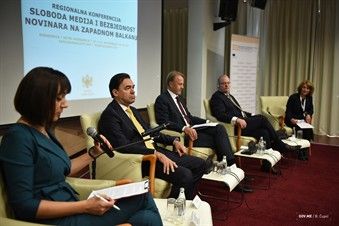
Speaking about the socioeconomic status of journalists, as the third significant condition for free journalism, he noted that it is worrying that about 800 Montenegrin journalists have personal income below the national average, while every third journalist earns less than EUR 400 a month. "The Government will support the establishment of the Media Fund in the new media law, in order to encourage the freedom of the media, in order for the media to have their place in society and be sustainable, but at the same time we expect the media to take into account the existential status of journalists and to raise it far higher than the current level."
The Deputy Prime Minister stressed that the safety of journalists is the dominant responsibility of the state. "If freedom of expression is not an absolute right, the safety of journalists must be absolute. And that's uncompromising."
He recalled that four cases of violence against journalists were registered this year. In three of these four cases, perpetrators were identified and proceedings were initiated. "The most painful one, the attack on Ms. Olivera Lakić has not been fully investigated yet and it still arouses justifiable concern within the whole society. The success and the result of this investigation will be a criterion in assessing the outcome of the people who are responsible for solving these cases, and on the other hand it is also a test of trust that a society should have in these institutions."
The Deputy Prime Minister recalled that the Government had accepted all recommendations of the Commission for monitoring the investigation of attacks on journalists and media assets, adding that the Government fully supports the work of this Commission.
22 November 2018 - The OSCE Mission to Montenegro, in partnership with the Ministry for Human and Minority Rights and the Department for Gender Equality, delivered three two-day workshops during October and November 2018 to gender equality focal points from 12 Montenegrin municipalities on how to train their colleagues on understanding gender equality and gender mainstreaming.
The workshops, held in Podgorica on 24-26 October, 1-2 November and 13-14 November 2018, provided participants with an opportunity to learn how to plan and deliver training courses and organize awareness-raising events within their respective municipalities. Through an interactive approach, the experts strengthened the participants’ knowledge of gender mainstreaming, explained the legal framework about gender equality, and presented training techniques and skills.
The OSCE Mission, in cooperation with the Parliamentary Committee for Gender Equality in Montenegro, held the training courses on gender mainstreaming to ensure that gender equality is a core component in legislative drafting. Members of Parliament and parliamentary committee staff discussed how to analyse legislation from a gender perspective, strategize to mainstream gender in state institutions and develop gender equality policy consistent with international standards.
“We want to support the parliament in its efforts to translate its legislative commitments into good practices, to become more and more a gender-sensitive parliament,” says Ana Krušić, Senior Programme Assistant at the OSCE Mission to Montenegro. The OSCE Mission to Montenegro has been working in partnership with the parliament for many years on projects which, in addition to the promotion of gender mainstreaming, have included capacity building of committees, working with administrative staff and supporting exchanges of regional experiences. Gender expert Karolina Leaković, who led the training course, said: “Cooperation with the parliament and its service is important because the parliament is at the centre of the legislative process and has an important role in developing gender-sensitive legislation and promoting principles of gender equality.”
The training course is a part of the education on gender equality and gender mainstreaming envisaged by the Action Plan for a Gender Sensitive Parliament, which was developed and adopted by the Committee with the support of the Mission and the OSCE Office for Democratic Institutions and Human Rights. The first course was organized in April this year.
Read more about OSCE mission here.
20 November 2018 - Prime Minister Duško Marković hosted an inaugural visit by the newly appointed Ambassador of Saudi Arabia Abdul Momin bin Mohammed Sharaf. At this meeting, the two officials concluded that Montenegro and the Kingdom of Saudi Arabia will strengthen bilateral relations that will be further built by enhanced economic cooperation.
Ambassador Sharaf said that Saudi Arabia has a clear economic vision by 2030, focusing on trade and investment. He added that he hopes to build a partnership with Montenegro, as well as with other Western Balkan countries.
Prime Minister Marković said that Montenegro has created important preconditions for the future and a better life of citizens and that it showed its seriousness and credibility in the past year and a half as a full-fledged member of NATO, as well as during six years of negotiations with the European Union.
The Prime Minister pointed out that Montenegro has a lot of development potential in tourism, energy, as well as in agriculture and food production. Prime Minister Marković emphasized that Montenegro is a safe and secure country with incentive tax policy. He added that the Montenegrin economy recorded significant economic growth in the last two years.
Both sides agreed that it would be a good idea to organise a presentation of potentials for businessmen and investors from Saudi Arabia, and the Ambassador expressed particular interest in the field of agriculture.
20 November 2018 - Prime Minister Duško Marković expressed satisfaction with the results that the Government has achieved in the first half of its mandate, adding that the Government will continue this way in the upcoming period.
At the meeting of the Foreign Investors Council in Podgorica, the Prime Minister emphasised that all of Montenegro picked up the momentum that leads to prosperity and the future. Public finances are stabilized, we have macroeconomic stability, and investment activity has increased. The achieved economic growth rates of 4.8% in the first half of the year are among the highest in the region and in Europe – the Prime Minister said.
Recalling the unfavourable conditions in which the 41st Government of Montenegro began its mandate – the high budget deficit and public debt, unfavourable regional and wider environment – the Prime Minister said that the success was not likely to happen.
He said that when he took over as the Prime Minister, there were more reasons to believe we won’t succeed to overcome problems, but we managed. We provided a positive trend, we took the opportunity given to us and responded seriously to all the challenges.
Prime Minister Marković referred to progress in the field of European integrations and added that in December we will have a total of 32 open chapters because we have received information that Chapter 27 on environmental protection will be opened in December. He also pointed out the fact that as a NATO member we have shown that we are able to fulfill the Alliance's obligations.
Montenegro, PM Marković noted, is an exporter of overall stability.
The Prime Minister said that the Government's policies resulted in high economic growth, adding that the growth estimates for 2018 cannot be below 4.1%.
PM Marković emphasised that foreign direct investments, which increased in the first nine months of this year by 48% compared to the same period last year, and the creation of new jobs also represent a successful result.
"These achievements of the Government's work have resulted in the creation of 9,000 jobs. Until recently, we couldn't speak about the creation of new jobs at all, not to mention this number of new jobs. This is a fantastic result. This is a decrease in the unemployment rate of 4% according to the Employment Agency of Montenegro, which is not very reliable because it contains data that do not give a real picture, and a decrease of 4.6% in the unemployment rate according to the survey. Now, unemployment is at the level of 14.4%, and in December 2017, it was over 21%, according to both records," Prime Minister Marković noted.
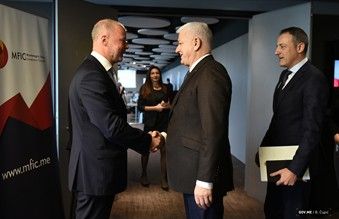
The Prime Minister said that the Government will continue to work in the same way in the following period: "I want to continue with such results," PM Marković said, adding that the next year's budget will be developmental.
The Prime Minister said that the Government would persevere in order to adopt the Law on Fiscalization in the trade of goods and services, but it will consider all the objections coming from stakeholders. He thanked for understanding and support expressed by the Foreign Investors Council towards this legal solution. He added that he expects the law to become effective next year, while its full implementation is foreseen for 2021.
Commenting on the country's decline in the Doing Business list, PM Marković said that in the previous period we had adopted laws that should improve the business, facilitate business and eliminate barriers. However, he said that the problem is likely in the implementation of the law and that it must be solved.
In that context, the Law on Spatial Planning and Building Construction has been mentioned, whose effects are still being examined.
"I still do not see what I expected and I was told that we will get a new law. They warn me that wild construction is growing, that we have few inspections, that the plans are being adopted slower than before," the Prime Minister concluded.
19 November 2018 - On the sidelines of the conference "European Values, Rule of Law and Security", which took place in Vienna on November 19, Interior Minister of Montenegro Mevludin Nuhodžić met with his Austrian counterpart Herbert Kickl.
Minister Kickl praised the results Montenegro has achieved in the negotiation process with the European Union, especially regarding chapters 23 and 24.
"Montenegro is EU's extremely important strategic partner in the field of security. Montenegro's place, as well as of the region as a whole, is in the EU," stressed Minister Kickl. He added that Austria will continue to strongly support Montenegro's EU bid by providing concrete assistance to capacity building and harmonisation with European standards in the fields of justice, freedom and security.
Minister Nuhodžić thanked the Government of Austria for the continued efforts to keep the European perspective of the Western Balkans high on the agenda of the EU, and in particular for supporting Montenegro.
It was noted that there is room for further improvement of bilateral police cooperation in combating organised crime and terrorism.
"The situation on the continent is unique in recent history when it comes to security challenges: we all face the same or almost the same threats. Only their intensity varies Therefore, we need to use this fact in a way to cooperate even more intensively and, without exception, to implement what we have agreed as quickly as possible, with the highest quality and commitment. Only then can we be effective. There must be nothing of greater priority than what directly affects the security of our countries and our citizens," said Minister Nuhodžić, but also noted that global security challenges countries worldwide face every day request world's unity in tackling them.
"We need to act together in order to stop trafficking in human beings, drugs or weapons, or potential terrorists. The answer to these challenges can only be in the cooperation between the states. Challenges are such that if only one link fails - it then becomes the problem of not only one country, but much broader. First of all, Montenegro is a responsible state, consistent in meeting all undertaken obligations. By doing that not only do we protect ourselves but others as well," the Interior Minister of Montenegro concluded.
19 November 2018 - Minister of Foreign Affairs, Srđan Darmanović, said again that Montenegro would vote for membership of Kosovo in Interpol. He also said that the relations with Serbia have become more stable ever since Montenegro regained its independence.
Darmanović said clearly that Montenegro cannot influence the agreement Kosovo and Serbia reach regarding the exchange of territories.
“We wish all the best to both of our neighbors. We have always supported their dialogue, but Montenegro cannot be the promoter of the solution. Montenegro does not want crisis and tensions in the region,” said Darmanović.
He pointed out that relations with Serbia are good regardless of some political disagreements that have always been there.
Darmanović also commented on the Nikola Gruevski passing through Montenegro and said he didn’t see anything wrong with that.
“At that time, Gruevski was not at the Interpol’s list of Wanted Persons and Macedonia never gave any signals that he was a person out of the law,” says Darmanović.
He also thinks that tense relations between Montenegro and Russia are passed.
“It would be nice if Russia could understand that their policy in the Balkans has finished in Montenegro. It is NATO member now and the issue is resolved,” said Darmanović.
Text by CdM, on November 19, 2018, read more at CdM.
19 November 2018 - On 19 November 2018, the 15th Jubilee Vienna Economic Forum – Vienna Future Dialogue 2018 under the motto "Economy meets Politics" took place under the Patronage of H.E. Mr. Sebastian Kurz, Federal Chancellor of Austria, and an official event of the Austrian Presidency of the Council of the EU.
Prime Minister of Montenegro Duško Marković spoke during the panel in Vienna, explaining that Montenegro has ambitious plans during Austrian presidency of the Council of the European Union, and these ambitions are based on assessments from the latest EC document.
"As you are aware, Montenegro has the ambition to make progress during the Austrian presidency. We base our optimism on the assessment from the latest EC's document on the rule of law that shows a balanced and thus realistic image of the efforts that Montenegro continuously invests in the implementation of reforms within the negotiation process. I am convinced that Austria and the countries of the European Union will objectively assess our results," Prime Minister Marković said at the Vienna Economic Forum. He also took part in meetings with the Austrian Federal Chancellor Sebastian Kurz and EU commissioners Johannes Hahn and Mariya Gabriel.
The Prime Minister thanked Chancellor Kurz and the EU commissioners for the positive and inspiring meetings. He was pleased that he discussed the continuation of important discussions for the region with Commissioner Hahn and Commissioner Gabriel. It was important for Montenegrin representatives to hear Austria's plans during its presidency, but also to present the country’s plans and ambitions.
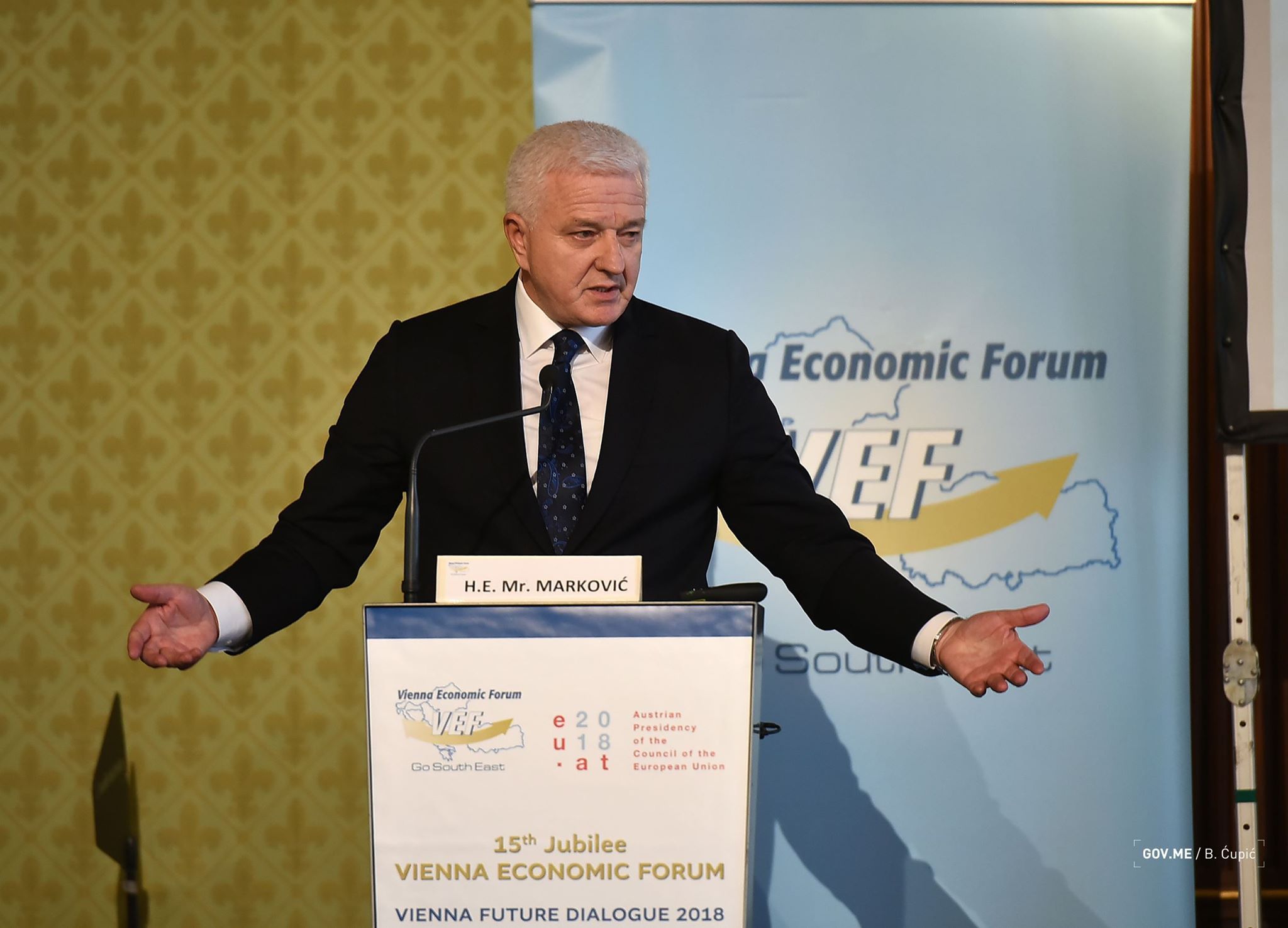
The host, Federal Chancellor Kurz, told at the press conference that Austria, during its presidency of the Council of the European Union, will focus on three areas: the region's path towards the European Union, the necessary regional cooperation and the resolution of bilateral disputes in the region. Commissioner for Enlargement and Neighbourhood Policy Johannes Hahn emphasised that all Western Balkan countries have a European perspective, although it is not realistic that they all join the Union at the same time.
Commissioner for Digital Economy and Society Mariya Gabriel told Western Balkan leaders that they can count on the EU support and that the EC will continue to invest in talented people in the region. "Digital agenda for the Western Balkans is our objective. It is up to us to continue this process," Commissioner Gabriel noted during the economic forum in Vienna.
The prime ministers of the six Western Balkan countries assessed as particularly important the fact that Austria insists on the enlargement agenda.
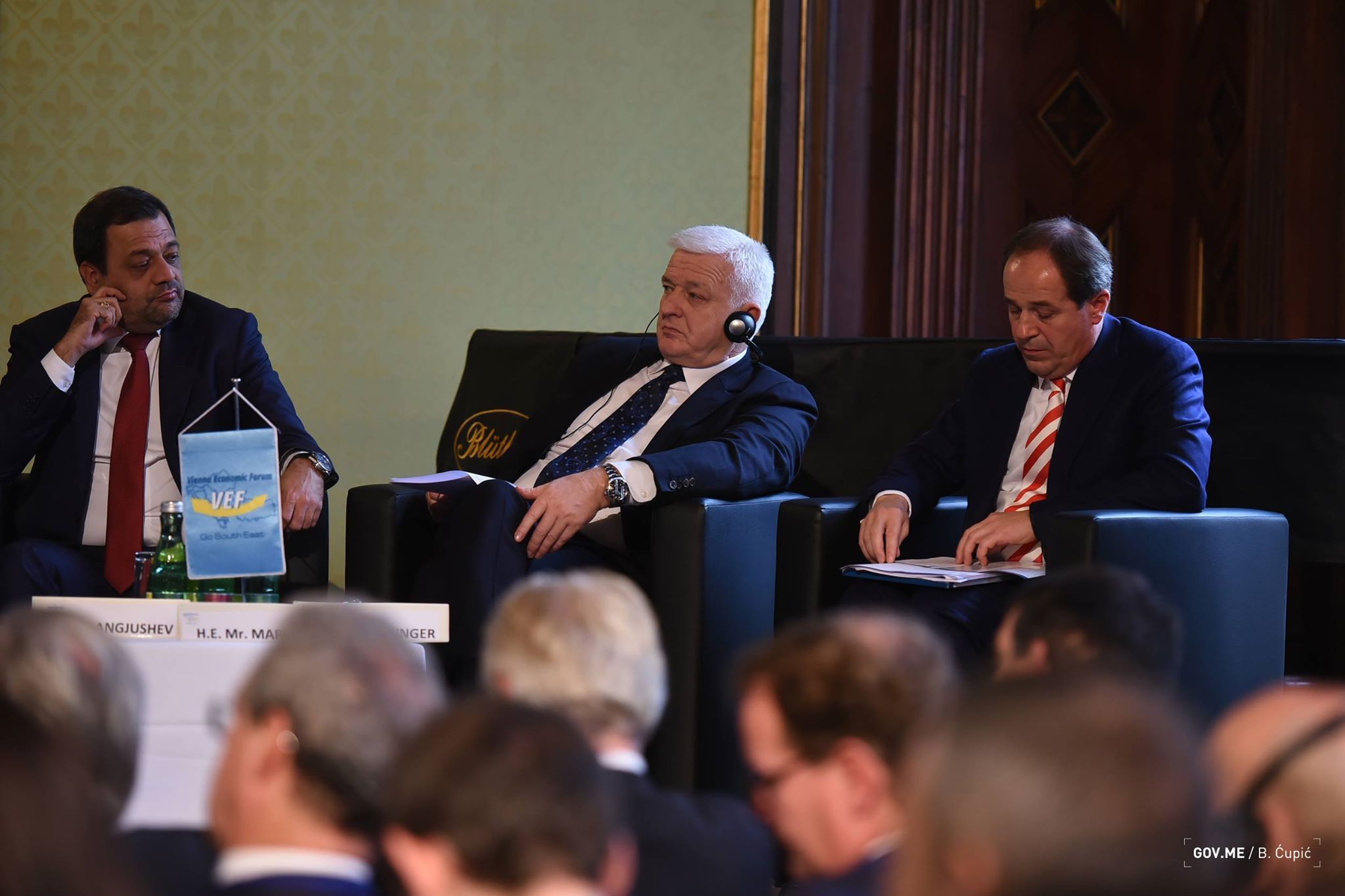
Prime Minister of Serbia Ana Brnabić thanked the host, Chancellor Kurz, for working on the more integrated region and keeping the EU's policy of enlargement on the European agenda. "Serbia is strongly committed to the EU agenda. On the regional level, the connectivity agenda is a priority for Serbia," Prime Minister Brnabić said.
Chairman of the Council of Ministers of Bosnia and Herzegovina Denis Zvizdić said that strengthening of the cooperation with the EU contributes to the further development of the Western Balkans. He especially emphasised the importance of the fact that the EU's door remains open.
Prime Minister of Albania Edi Rama said that the region is facing challenges of the cooperation, while Prime Minister of Kosovo Ramush Haradinaj said that his country has fulfilled all conditions for visa liberalization, including the last condition – border demarcation with Montenegro.
18 November 2018 - Montenegro must not slow down its progress on its road to the European Union and it should be focused primarily on closing the chapters. It would be desirable to open Chapter 27 during Austria’s European Union presidency and for the country to complete the Action Plan for Chapters 23 and 24, as noted by the Ambassador of Slovenia to Montenegro, Mitja Močnik. He also said Montenegro has been an example of good practice to other countries of Balkans region.
Slovenia and Montenegro cherish good relations and based on the positive experience and practice in project implementation, Slovenia perceives Montenegro as a priority programme for European Union integration in the region.
“The two states have been implementing a programme-based bilateral development cooperation, mostly for a two-year period of time. The 2018-19 programme is going to be signed on November 23, 2018. The total value of the project amounts to 1,848,949 EUR. Development projects usually refer to the less developed North Montenegro. Slovenia has been offering assistance to Montenegro for this year as well, also through a technical assistance, funded by the European Union’s instrument for pre-accession assistance. Our experts are mostly engaged in Montenegro when compared with other countries of the region,” noted Ambassador of Slovenia to Montenegro Mitja Močnik.
According to him, Montenegro should focus on closing the negotiation chapters, but also added that Montenegro represents a source of stability in the region.
“Some European Union member states are not inclined to speedy opening/closing of the chapters, which does not mean they oppose the enlargement process. Montenegro is a leader in negotiation talks, having in mind dynamics and the number of opened chapters. We must beware of the fact Montenegro restored the independence in 2006 and that it is extremely significant to achieve genuine progress in strengthening macroeconomic, fiscal and tax stability,” Močnik concluded.






